- Paul Zukofsky
- Les Adieux
- piano concertos
- W H Auden
- Philharmonia Orchestra
- Polyansky
- New Orford Quartet
- Tomáš Brauner
 UPDATES: There's a new feature every day at Classical Music Daily. Read about the various ways we can keep in touch with you about what's happening here.
UPDATES: There's a new feature every day at Classical Music Daily. Read about the various ways we can keep in touch with you about what's happening here.
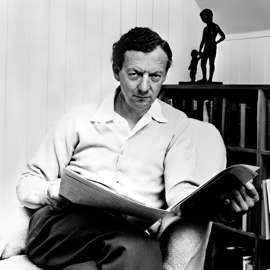 SPONSORED: Ensemble. Last Gasp of Boyhood. Roderic Dunnett investigates Jubilee Opera's A Time There Was for the Benjamin Britten centenary.
SPONSORED: Ensemble. Last Gasp of Boyhood. Roderic Dunnett investigates Jubilee Opera's A Time There Was for the Benjamin Britten centenary.
All sponsored features >>
On the High and Open Sea
GIUSEPPE PENNISI samples
Italy's 2019 Ravenna Summer Festival
The Ravenna Festival has reached its thirtieth anniversary. It is now the most important Italian festival of performing arts - mainly music but also drama and ballet. It is a top European festival too. Every year the festival has a theme. In this 2019 edition, the theme is from a verse by Dante, who lived the last part of his life and died in Ravenna: to sail 'on the high and open sea'. It is an invitation to hope for a better future. The 2019 Festival has a Mediterranean focus, especially on Greece.
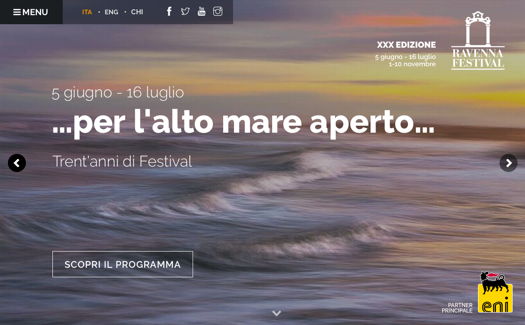
The Ravenna Festival website, showing the 2019 festival theme, in Italian
The Festival has two parts. The Summer Festival (5 June-16 July) takes place in Ravenna and neighbouring towns and involves more than two hundred different performances of symphonic music, chamber music, religious music, contemporary music, live electronics, drama, ballet and other categories of performing arts. During a three day stay in Ravenna, a reviewer can provide only a sample of the vast and diversified program. There is also an Autumn Festival from 1 to 10 November, an opera trilogy. This year, it is devoted to women from bel canto to the anti-chamber of verismo: Norma, Aida and Carmen. They have the same stage direction and production design. One can see and hear the three operas over a span of three days, but it is essential to book early. Ravenna is a medium size town; in addition to the Festival, it has an interesting opera and winter concert season.
On 5 June 2019, the opening concert featured two international stars - conductor Riccardo Muti and pianist Maurizio Pollini - and a well-known young orchestra, the Orchestra Giovanile Cherubini, created by Riccardo Muti in 2004 and often invited to the Salzburg Summer Festival. Every year, the orchestra renews almost a third of its members to keep its overall average profile young. The concert took place in the De André auditorium, a venue for an audience of three thousand. It was sold out.
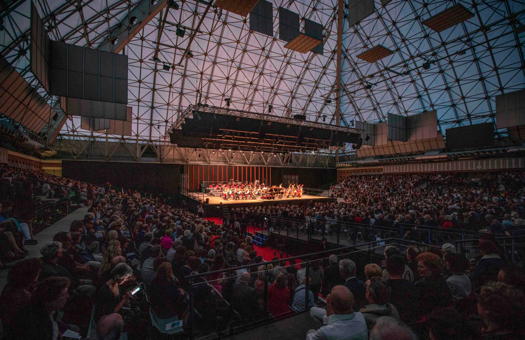
The Muti/Pollini concert in the De André auditorium. Photo © 2019 Silvia Lelli
The program was quite eclectic. The first part encompassed two piano concertos by Mozart - K 449 in D major and K 466 in D minor. The second part included Mendelssohn-Bartholdy's overture Meerestille und glückliche Fahrt (travelling happily on a quiet sea, usually known in English-speaking countries as the 'Calm Sea and Prosperous Voyage' overture), and Ravel's Boléro. Mendelssohn's 'serene reflection of untroubled waters' is the signature of the Festival and contrasts sharply with Ravel's tense and agitated Boléro. Similarly, in the first part, the D minor Mozart concerto is more tense and elaborate than the previous work in D major, even though they both focus on the delicate balance the composer is seeking between tradition and innovation. In the two piano concertos, innovation means that the soloist at the piano would not merely develop a dialogue with the orchestra but would become gently part of the ensemble.
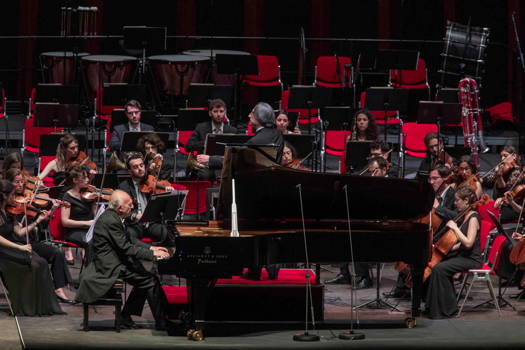
Maurizio Pollini, Riccardo Muti and members of the Orchestra Giovanile Cherubini performing Mozart. Photo © 2019 Silvia Lelli
Maurizio Pollini did very well; during the intermission, he received the Ravenna Festival award for his career. However, the real protagonist of the evening was the orchestra under Muti's baton. The audience was fully enveloped by their round sonorities and could appreciate the quality of groups of instrumentalists: the strings in the Mozart and Mendelssohn compositions and the woodwind, brass and percussion in Ravel's Boléro. The audience was enthralled and responded with accolades and ovations.
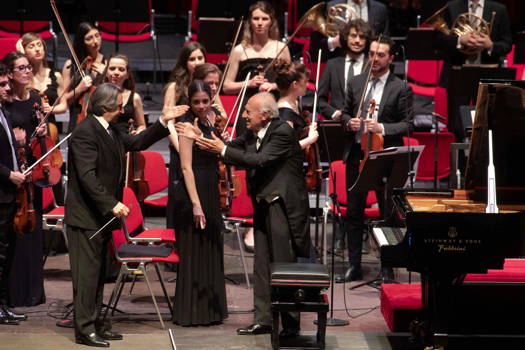
Riccardo Muti, Maurizio Pollini and members of the Orchestra Giovanile Cherubini. Photo © 2019 Silvia Lelli
Other major symphonic concerts feature conductors such as Leonidas Kavakos, Giovanni Antonini, Antonio Greco and Emmanuel Krivine. Riccardo Muti will return to the Festival to conduct Beethoven's Ninth Symphony in both Ravenna and Athens, as this year's 'roads to friendship' section is devoted to Greece, as mentioned above. In addition, within the Festival, a grand production of Handel's Messiah is scheduled. Among the guest orchestras, the Orchestre National de France and Il Giardino Armonico are on the program.
On 6 June, late in the morning, in the ancient Franciscan cloisters, I was in the audience for the premiere of a section named Young Artists for Dante, a cycle of eight musical and dramatic shows conceived and implemented by young artists. The title of the show was The Love of the Angels. The young artists from the Ravenna Art School prepared the texts, the music, the sets and the costumes. It was a fully staged reflection on art making today. Its main point is that music, sculpture, theatre and visual arts have an added dimension - depth - if compared to cinema, television, computer and mobile phone screens. Combining acting, dance, music, painting and set design, the young performers - all about eighteen years old - pay homage to the mixed teaching they received - a teaching which comprises both theoretical and practical subjects. This was an engrossing experience for the audience.
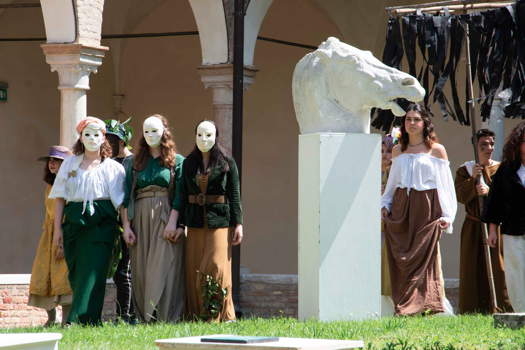
L'amore degli angeli from Giovani Artisti per Dante. Photo © 2019 Martina Zanzani
On 6 June at 7pm - Vespers time - in the magnificent Byzantine San Vitale Basilica, I attended the first performance of a cycle of eighteen concerts - some repeated for a few days - on religious subjects. This was a compact contemporary music drama titled E immediatamente diventai sapiente (And suddenly I became wise) based on the turbatissime visioni (very troubled visions) of the twelfth-century nun, Hildegard von Bingen. The libretto is by musicologist Guido Barbieri, and the score is by composer Francesco Maria Paradiso. Lasting about fifty minutes, and following a minimalist approach, it requires a soprano, an actress, a flute player and live electronics. In the suggestive Basilica, the audience appreciated it. I do not know whether it would work in a theatre. Future shows of this section include Psalms, Greek Gregorian music, contemporary sacred music and Franciscan singing.
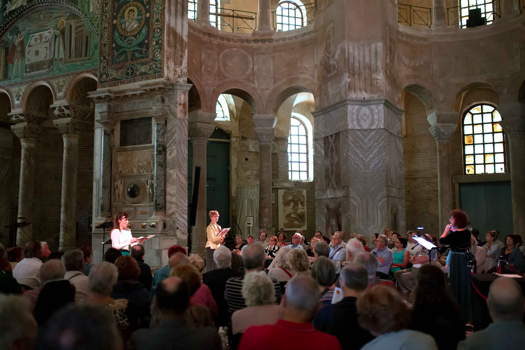
The performance of E immediatamente diventai sapiente in the San Vitale Basilica. Photo © 2019 Luca Concas
I concluded my visit to the Festival in the nearby town of Forlì, in the San Giacomo auditorium, a former church within a former Dominican monastery. Within such a complex, there has been, for several months, a much-visited exhibition of Italian painting in the nineteenth century. The program was a concert version of Mikis Theodorakis' music for Zorba the Greek. Based on a 1943 novel, the plot became first the core of a successful 1964 movie and then of a Broadway musical. In 1988, a ballet version had its debut in the Verona Arena. The concert version is in two parts and twenty-six short numbers or scenes, forming a tone poem of about two hours including intermission. The libretto is the product of six Greek authors.
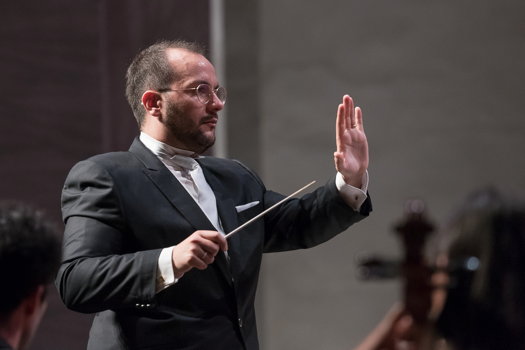
Jacopo Rivani conducting Zorba the Greek on 7 June 2019. Photo © 2019 Angelo Palmieri
It requires an opera size orchestra - Orchestra Arcangelo Corelli, conducted by Jacopo Rivani, a large chorus - Coro Euridice led by Pier Paolo Scattolin, and a mezzo, Cecilia Bernini. The score is not experimental and is meant to attract a large audience. It is quite skilful: the numbers or scenes alternate between 'largo', full of Mediterranean melancholy, and 'scherzo' or 'vivace', full of rhythm. The performers were high class. The audience applauded warmly.
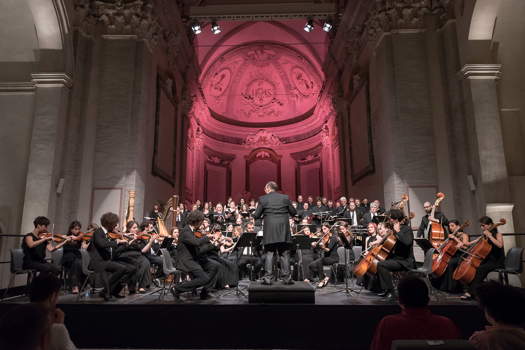
The performance of Theodorakis' Zorba the Greek in Forlì. Photo © 2019 Angelo Palmieri
To end with, two important features of the drama section - a modern re-writing of Oedipus at Colonus and several performances of Dante's Purgatorio, fully staged and with some 100 actors, mimes and extras. In the ballet section, there are, inter alia, the Martha Graham Dance Company and the Hamburg Ballet John Neumeier. The contemporary and electronics music section has a very dense program, including a cycle on percussion. In short, a very ample menu of which this article is only an appetizer.
Copyright © 9 June 2019
Giuseppe Pennisi,
Rome, Italy



